- Home
- Tracy Chevalier
The Virgin Blue Page 3
The Virgin Blue Read online
Page 3
— Go and wait outside, La Rousse, Jean said quietly. You go with her, Susanne.
The girls sat side by side on the door bench. They had seen little of each other since they were children. Many years ago, even before Isabelle's hair turned red, Susanne had played with Marie, helping with the haying, the goats, splashing in the river.
For a while they sat, looking out over the valley.
— I saw a wolf out by the cleda, Isabelle said suddenly.
Susanne stared, brown eyes wide. She had the thin face and pointed chin of her father.
— What did you do?
— Chased it with a stick. She smiled, pleased with herself.
— Isabelle —
— What is it?
— I know Maman is upset, but I am glad you will live with us. I never believed what they said about you, about your hair and — She stopped. Isabelle did not ask.
— And you will be safe here. This house is safe, protected by —
She stopped again, glanced at the door, bowed her head. Isabelle let her eyes rest on the shadowy humps of the hills in the distance.
It will always be like this, she thought. Silence in this house. The door opened and Jean and Etienne emerged with a flickering torch and an axe.
— We will take you back, La Rousse, Jean said. I must speak with your father.
He handed a piece of bread to Etienne.
— Take this bread together and give her your hand.
Etienne tore the bread in two and gave the smaller piece to Isabelle. She put it in her mouth and placed her hand in his. His fingers were cold. The bread stuck in the back of her throat like a whisper.
Petit Jean was born in blood and was a fearless child.
Jacob was born blue. He was a quiet child: even when Hannah smacked his back to start his breath he did not scream.
Isabelle lay in the river again, many summers later. There were marks on her body from the two boys, and another child pushing her belly above the water. The baby kicked. She cupped the mound with her hands.
— Please let the Virgin make it a girl, she prayed. And when she is born I will name her after you, after my sister. Marie. I will fight everyone to name her that.
This time there were no warnings at all, no bells, no sense of eyes on her. He was just there, sitting on his heels on the river bank. She sat up and looked at him. She did not cover her breasts. He looked the same, a little older, with a long scar down the right side of his face, from his cheekbone to his chin, touching the corner of his mouth. This time she would have smiled back at him if he had smiled. The shepherd did not smile. He simply nodded at her, cupped his hands, splashed water on his face, then turned and walked in the direction of the river's source.
Marie was born in a flood of clear liquid, her eyes open. She was a hopeful child.
2
THE DREAM
When Rick and I moved to France, I figured my life would change a little. I just didn't know how.
To begin with, the new country was a banquet where we were ready to try every dish. Our first week there, while Rick was sharpening his pencils at his new office, I knocked the rust from my high-school French and set out to explore the countryside surrounding Toulouse and to find us a place to live. A small town was what we wanted; an interesting town. I sped along little roads in a new grey Renault, driving fast through long lines of sycamores. Occasionally when I wasn't paying attention I thought I was in Ohio or Indiana, but the landscape snapped back into itself the moment I saw a house with a red tile roof, green shutters, window boxes full of geraniums. Everywhere farmers in bright blue work pants stood in fields dusted with pale April green and watched my car pass across their horizon. I smiled and waved; sometimes they waved back, hesitantly. ‘Who was that?’ they were probably asking themselves.
I saw a lot of towns and rejected them all, sometimes for frivolous reasons, but ultimately because I was looking for a place that would sing to me, that would tell me my search was over.
I arrived in Lisle-sur-Tarn by crossing a long narrow bridge over the River Tarn. At the end of it a church and a café marked the town's edge. I parked next to the café and began to walk; by the time I reached the centre of town I knew we would live there. It was a bastide, a fortified town preserved from the Middle Ages; when there were invasions in medieval times the villagers would gather in the market square and close off its four entrances. I stood in the middle of the square next to a fountain with lavender bushes planted around it and felt contained and content.
The square was surrounded on all four sides by an arched, covered walkway, with shops on the ground level and shuttered houses above. The arches were built of long narrow bricks; the same bricks made up the top two levels of the houses, laid horizontally or diagonally in decorative patterns between brown timbers, held together with dull pink mortar.
This is what I need, I thought. Seeing this every day will make me happy.
Immediately I began having doubts. It seemed absurd to decide on a town because of one beautiful square. I began to walk again, looking for that deciding factor, the sign that would make me stay or go.
It didn't take long. After exploring the surrounding streets I entered a boulangerie on the square. The woman behind the counter was short and wore a navy blue and white housecoat I'd seen for sale at every market I had visited. When she finished with another customer she turned to me, black eyes scrutinizing me from a lined face, hair pulled back in a loose bun.
‘Bonjour, Madame,’ she said in the singsong intonation French women use in shops.
‘Bonjour,’ I replied, glancing at the bread on the shelves behind her and thinking: This will be my boulangerie now. But when I looked back at her, expecting a warm welcome, my confidence fell away. She stood solidly behind the counter, her face like armour.
I opened my mouth: nothing came out. I swallowed. She stared at me and said, ‘Oui, Madame?’ in exactly the same tone she'd first used, as if the last few awkward seconds hadn't occurred.
I hesitated, then pointed at a baguette. ‘Un,’ I managed to say, though it sounded more like a grunt. The woman's face modulated into the stiffness of disapproval. She reached behind her without looking, eyes still fixed on me.
‘Quelque chose d'autre, Madame?’
For a moment I stepped outside myself and saw myself as she must see me: foreign, transient, thick tongue stumbling over peculiar sounds, dependent on a map to locate me in a strange landscape and a phrasebook and dictionary to communicate. She made me feel lost the very moment I thought I'd found home.
I looked at the display, desperate to show her I wasn't as ridiculous as I seemed. I pointed at some onion quiches and managed to say, ‘Et un quiche.’ A split second afterwards I knew I'd used the wrong article – quiche was feminine and should be used with une – and groaned inwardly.
She put one in a small bag and laid it on the counter next to the baguette. ‘Quelque chose d'autre, Madame?’ she repeated.
‘Non.’
She rang up the purchases on the cash register. Mutely I handed her the money, then realized when she placed my change on a small tray on the counter that I should have put the money there rather than directly into her hand. I frowned. It was a lesson I ought to have learned already.
‘Merci, Madame,’ she intoned with a blank face and flinty eyes.
‘Merci,’ I mumbled.
‘Au revoir, Madame.’
I turned to go, then stopped, thinking there must be a way to salvage this. I looked at her: she had crossed her arms over her vast bosom.
‘Je – nous – nous habitons près d'ici, là-bas,’ I lied, gesturing wildly behind me, clawing out a territory somewhere in her town.
She nodded once. ‘Oui, Madame. Au revoir, Madame.’
‘Au revoir, Madame,’ I replied, spinning around and out the door.
Oh Ella, I thought as I trudged across the square, what are you doing, lying to save face?
‘So don't lie, then. Live here. Confro
nt Madame every day over the croissants,’ I muttered in reply. I found myself by the fountain and reached over to a lavender bush, pulled off a few leaves and crushed them between my fingers. The sharp woody scent said: Reste.
Rick loved Lisle-sur-Tarn when he saw it, and made me feel better about my choice by kissing me and spinning me around in his arms. ‘Hah!’ he shouted at the old houses.
‘Shh, Rick,’ I said. It was market day in the square and I could feel all eyes on us. ‘Put me down,’ I hissed.
He just smiled and held me more tightly.
‘This is my kind of town,’ he said. ‘Just look at the detail in that brickwork!’
We wandered all over, picking out our favourite houses. Later we stopped at the boulangerie for more onion quiches. I turned red the moment Madame looked at me, but she directed most of her remarks at Rick, who found her hilarious and chuckled at her without appearing to offend her in the slightest. I could see she found him handsome: his blond ponytail in this land of short dark hair was a novelty and his Californian tan hadn't faded yet. To me she was polite, but I detected an underlying hostility that made me tense.
‘It's a shame those quiches are so good,’ I remarked to Rick out on the street. ‘Otherwise I'd never go in there again.’
‘Oh babe, there you go, taking things to heart. Don't go all East-coast paranoid on me, now.’
‘She just makes me feel unwelcome.’
‘Bad customer relations. Tut-tut! Better get a personnel consultant in to sort her out.’
I grinned at him. ‘Yeah, I'd like to see her file.’
‘Positively riddled with complaints. She's on her last legs, it's obvious. Have a little pity on the old thing.’
It was tempting to live in one of the old houses in or near the square, but when we found out none were for rent I was secretly relieved: they were serious houses, for established members of town. Instead we found a place a few minutes' walk from the centre, still old but without the fancy brickwork, with thick walls and tiled floors and a small back patio sheltered by a vine-covered trellis. There was no front yard: the front door opened directly onto the narrow street. The house was dark inside, though Rick reminded me that it would be cool during the summer. All of the houses we'd seen were like that. I fought against the dimness by keeping the shutters open, and caught my neighbours peeking through the windows several times before they learned not to look.
One day I decided to surprise Rick: when he came home from work that night I'd painted over the dull brown of the shutters with a rich burgundy and hung boxes of geraniums from the windows. He stood in front of the house smiling up at me as I leaned over the window sill, framed in pink and white and red blossoms.
‘Welcome to France,’ I said. ‘Welcome home.’
When my father found out Rick and I were going to live in France he encouraged me to write to a cousin several times removed who lived in Moutier, a small town in northwest Switzerland. Dad had visited Moutier once, long ago. ‘You'll love it, I promise,’ he kept saying when he called to give me the address.
‘Dad, France and Switzerland are two different countries! I probably won't get anywhere near Switzerland.’
‘Sure, kid, but it's always good to have family nearby.’
‘Nearby? Moutier must be 400, 500 miles from where we'll be.’
‘You see? Just a day's drive. And that's a lot closer than I'll be to you.’
‘Dad —’
‘Just take the address, Ella. Humour me.’
How could I say no? I wrote down the address and laughed. ‘This is silly. What do I write to him: “Hello, I'm a distant cousin you've never heard of before and I'm on the Continent, so let's meet up”?’
‘Why not? Listen, as an opening you could ask him about the family history, where we come from, what our family did. Use some of that time you'll have on your hands.’
Dad was driven by the Protestant work ethic, and the prospect of me not having a job made him nervous. He kept making suggestions about useful things I could do. His anxiety fuelled my own: I wasn't used to having free time – I'd always been busy either training or working long hours. Having time on my hands took some getting used to; I went through a phase of sleeping late and moping around the house before I devised three projects to keep me occupied.
I started by working on my dormant French, taking lessons twice a week in Toulouse with Madame Sentier, an older woman with bright eyes and a narrow face like a bird. She had a beautiful accent, and the first thing she did was to tackle mine. She hated sloppy pronunciation, and yelled at me when I began saying Oui in that throwaway manner many French have of barely moving their lips and letting the sound come out like a duck quacking. She made me pronounce it precisely, sounding all three letters, whistling the air through my teeth at the end. She was adamant that how I said things was more important than what I said. I tried to argue against her priorities, but I was no match for her.
‘If you do not pronounce the words well, no one will understand what you say,’ she declared. ‘Moreover, they will know that you are foreign and will not listen to you. The French are like that.’
I refrained from pointing out that she was French too. Anyway I liked her, liked her opinions and her firm hand, so I did her mouth exercises, pulling my lips around like they were made of bubblegum.
She encouraged me to talk as much as possible, wherever I was. ‘If you think of something, say it!’ she cried. ‘No matter what it is, however small, say it. Talk to everyone.’ Sometimes she made me talk non-stop for a set period of time, starting with one minute and working up to five minutes. I found it exhausting and impossible.
‘You are thinking a thought in English and then translating it word by word into French,’ Madame Sentier pointed out. ‘Language does not work like that. It has a grand shape. What you must do is to think in French. There should be no English in your head. Think as much as you can in French. If you cannot think in paragraphs, think in sentences, at least in words. Build it up into grand thoughts!’ She gestured, taking in the whole room and all of human intellect.
She was delighted to find out that I had Swiss relations; it was she who made me sit down and write. ‘They may have been from France originally, you know,’ she said. ‘It would be good for you to find out about your French ancestors. You will feel more connected to this country and its people. Then it will not be so hard to think in French.’
I shrugged inwardly. Genealogy was one of those middle-aged things I lumped together with all-talk radio stations, knitting and staying in on Saturday nights: I knew I would eventually indulge in all of them, but I was in no hurry about it. My ancestors didn't have anything to do with my life right now. But to humour Madame Sentier, as part of my homework I pieced together a few sentences asking my cousin about the history of the family. When she'd checked it for grammar and spelling I sent the letter off to Switzerland.
The French lessons in turn helped me with my second project. ‘What a wonderful profession for a woman!’ Madame Sentier crowed when she heard I was studying to qualify as a midwife in France. ‘What noble work!’ I liked her too much to be annoyed by her romantic notions, so I didn't mention the suspicion my colleagues and I were treated with by doctors, hospitals, insurance companies, even pregnant women. Nor did I bring up the sleepless nights, the blood, the trauma when something went wrong. Because it was a good job, and I hoped to be able to practise in France once I'd taken the required classes and exams.
The final project had an uncertain future, but it would certainly keep me busy when the time came. No one would have been surprised by it: I was twenty-eight, Rick and I had been married two years, and the pressure from everyone, ourselves included, was beginning to mount.
One night when we had lived in Lisle-sur-Tarn just a few weeks we went out to dinner at the one good restaurant in town. We talked idly – about Rick's work, my day – through the crudités, the pâté, trout from the Tarn and filet mignon. When the waiter brought Rick's crème br�
�lée and my tarte au citron I decided this was the moment to speak. I bit into the lemon slice garnish; my mouth puckered.
‘Rick,’ I began, setting down my fork.
‘Great brûlée,’ he said. ‘Especially the brûléed part. Here, try some.’
‘No thanks. Look, I've been thinking about things.’
‘Ah, is this gonna be serious talk?’
At that moment a couple entered the restaurant and were seated at the table next to us. The woman's belly was just visible against her elegant black dress. Five months pregnant, I thought automatically, and carrying it very high.
I lowered my voice. ‘You know how every now and then we talk about having kids?’

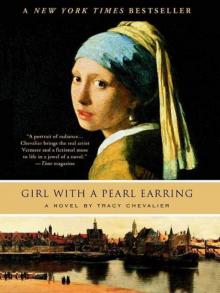 Girl With a Pearl Earring
Girl With a Pearl Earring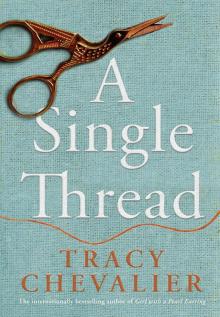 A Single Thread
A Single Thread Reader, I Married Him: Stories Inspired by Jane Eyre
Reader, I Married Him: Stories Inspired by Jane Eyre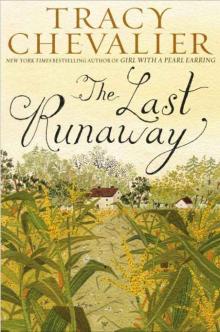 The Last Runaway
The Last Runaway Burning Bright
Burning Bright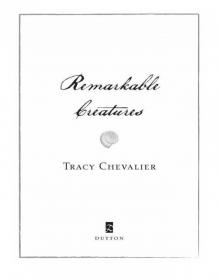 Remarkable Creatures
Remarkable Creatures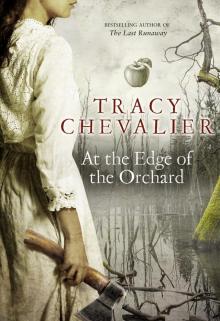 At the Edge of the Orchard
At the Edge of the Orchard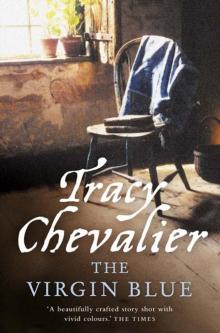 The Virgin Blue
The Virgin Blue The Lady and the Unicorn
The Lady and the Unicorn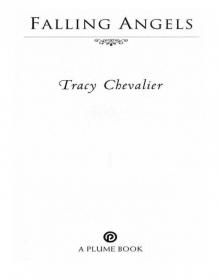 Falling Angels
Falling Angels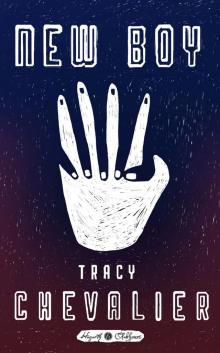 New Boy
New Boy Reader, I Married Him
Reader, I Married Him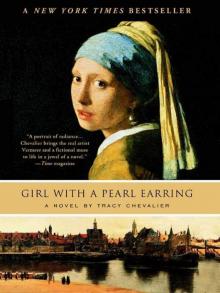 Girl with a Pearl Earring, The
Girl with a Pearl Earring, The